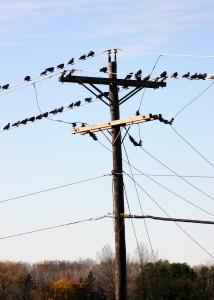
Morguefile image: http://mrg.bz/XbWC1u
Have you wondered why birds gather on utility wires like the ones in this picture? While I’m sure there’s some deep, dark secret as to why they do that, I’d say they’re probably networking. They perch high above the action so that they can see what’s going on. They go out to hunt food and face danger each day. When they return to their group, they share their experiences. That’s networking, and it’s an activity your marketing plan cannot be without.
Marketing is figuring out how to present yourself to other writers, editors, publishers, and potential readers. Networking helps you collect information on what your audiences want or need. Also, it helps them get to know about you and your work. Most people are more willing to recommend you or help you promote your work if they know you.
The concept of “platform” so often mentioned by those giving marketing advice to writers is just another facet of networking. People will buy your product if they know you or your previous work. So how does a writer build a network?
Join writers’ groups. Search online and ask around for local writer’s groups. Visit American Christian Writers website for a list of local chapters. If you live in a rural area, networking with other writers can be difficult. However, you can meet and work with other writers through online groups. Go to my previous post on online writers’ groups for details.
Attend writers’ conferences. By the end of November, most conferences are done for the year. However, there’s still time to sign up for the American Christian Writers Caribbean Cruise. Not in your budget? Actually, it’s not in mine, either. This is a good time to plan for conference attendance next year. Sally Stuart has a conference list on her website. Also, ChristianManuscriptSubmissions.com maintains a useful conference list.
Use social media. Although it can be a waste of time, social media do help you keep in touch with people you’ve met at conferences. And, it helps them to remember you. If you aren’t on Twitter or Facebook now, spend some time learning about it with my previous how-to post on social media. Don’t forget that blogging is a form of social media, too. Browse my site for a number of posts on blogging if you need help with that. Rachelle Garner recently wrote about social media on her blog. Definitely take a minute to read her post.
Writers can gather in person, like the birds on the light wire, or online to educate and encourage one another. The whole point of networking is to create a “flock” of people with whom you can share information. Don’t try to fly solo, especially if you are a beginner.
Have you wondered why birds gather on utility wires like the ones in this picture? While I’m sure there’s some deep, dark secret as to why they do that, I’d say they’re probably networking. They perch high above the action so that they can see what’s going on. They go out to hunt food and face danger each day. When they return to their group, they share their experiences. That’s networking, and it’s an activity your marketing plan cannot be without.Marketing is figuring out how to present yourself to other writers, editors, publishers, and potential readers. Networking helps you collect information on what your audiences want or need. Also, it helps them get to know about you and your work. Most people are more willing to recommend you or help you promote your work if they know you.The concept of “platform” so often mentioned by those giving marketing advice to writers is just another facet of networking. People will buy your product if they know you or your previous work. So how does a writer build a network?
Join writers’ groups. Search online and ask around for local writer’s groups. Visit American Christian Writers website for a list of local chapters. If you live in a rural area, networking with other writers can be difficult. However, you can meet and work with other writers through online groups. Go to my previous post on online writers’ groups for details.
Attend writers’ conferences. By the end of November, most conferences are done for the year. However, there’s still time to sign up for the American Christian Writers Caribbean Cruise. Not in your budget? Actually, it’s not in mine, either. This is a good time to plan for conference attendance next year. Sally Stuart has a conference list on her website. Also, ChristianManuscriptSubmissions.com maintains a useful conference list.
Use social media. Although it can be a waste of time, social media do help you keep in touch with people you’ve met at conferences. And, it helps them to remember you. If you aren’t on Twitter or Facebook now, spend some time learning about it with my previous how-to post on social media. Don’t forget that blogging is a form of social media, too. Browse my site for a number of posts on blogging if you need help with that. Rachelle Garner recently wrote about social media on her blog. Definitely take a minute to read her post.
Writers can gather in person like the birds on the light wire or online to educate and encourage one another. The whole point of networking is to create a “flock” of people with whom you can share information. Don’t try to fly solo, especially if you are a beginner.








